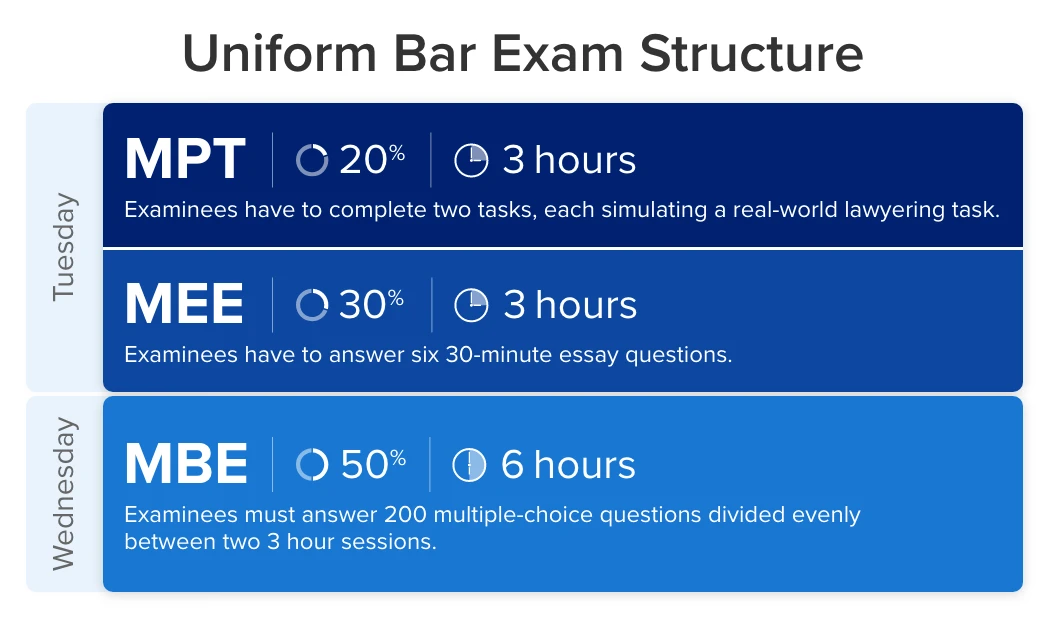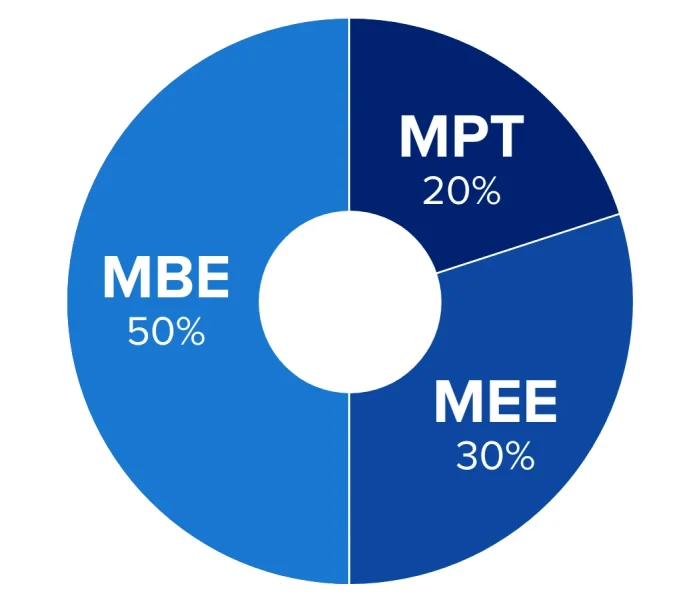
The Maryland Bar Exam adopted the Uniform Bar Exam (UBE®) in 2017 and began administering it in 2019. The UBE is divided into three sections—the Multistate Bar Examination (MBE®), the Multistate Performance Test (MPT®), and the Multistate Essay Examination (MEE®). To be accepted to the Maryland Bar, candidates must take an additional 50-question, multiple-choice Maryland Law Component (MLC).
Bar candidates that may want to eventually practice law in another state benefit from score portability between the 41 jurisdictions that have adopted the UBE. This article provides everything you need regarding MD bar exam results, dates, deadlines, fees, applications, and more.
The Uniform Bar Exam is administered over two days and consists of a writing section (MPT/MEE) and a multiple-choice section (MBE).


Preparing your application and submitting it on time is especially important in Maryland because there are no late filing periods. In other words, if you miss the deadline, you cannot sit for the MD Bar Exam. See below for important deadlines, dates, and fees.
Examinees applying for the Maryland State Bar Exam must file within the set filing period—there is no late filing and applications are reviewed on a rolling basis. You must also submit an official transcript of your pre-legal education and a Character Questionnaire ($350) with or before your primary application—both can be filed before the application period opens.
| Filing Periods | Application Opens | Fee |
|---|---|---|
| July 30-31, 2024 | April 1 - May 20, 2024 | $400 |
| February 27-28, 2024 | Nov 1 - Dec 20, 2023 | $400 |
The Maryland State Board of Law Examiners requires examinees to have graduated with a Juris Doctorate degree (JD) or equivalent from an American Bar Association (ABA) approved law school. This requirement may be waived if an applicant's legal education is commensurate with ABA standards by submitting an Eligibility Waives for Graduates of Non-ABA Law Schools. Waivers must be obtained before candidates create their Notice of Intent to take the UBE in Maryland.
First-time applicants must submit their official law school transcripts on or before September 1 or March 15 following the July and February exams, respectively.
To schedule your MD Bar Exam,
Maryland has no late filing period for its bar exam. If you miss the deadline, you cannot sit for the exam. All application-associated fees are detailed in the chart below.
| Application Fees | |
| Bar Exam Application Fee | $400 |
| Character Questionnaire Fee | $350 |
| Admission without Examination (Out-of-State Attorneys) | |
| Petition for Application without Submission | $700 |
| NCBE Character Investigation | $350 |
| Transfer UBE Score | $400 |
| Miscellaneous Fees | |
| ExamSoft registration | $130 |
| ExamSoft software | $50 |
Your Character Questionnaire fee and Notice of Intent fee must be paid with a check or money order made payable to "State Board of Law Examiners" and included with your filing.
From law school to bar prep to the actual bar exam, the journey to legal practice can be expensive. The good news is that many Maryland area organizations, including universities, foundations, and law firms, offer law students in the region various scholarships and grants to help with legal education and bar exam costs. For example:
We strongly encourage all candidates who plan on taking the Maryland Bar Exam to review as many of these scholarships as possible and apply to those for which they are eligible.
The MD bar exam tests an examinee's ability to analyze and reason alongside their knowledge and understanding of fundamental legal principles. Furthermore, since Maryland has adopted the UBE, a successful exam score represents one's competency and readiness to practice law in the 40 other participating jurisdictions.
Work with a dedicated attorney essay grader who will grade your essays and provide feedback.
The MEE consists of 6 essay questions. Each question involves one or more of the subjects listed below. Some subjects may be paired together. Other subjects could be omitted. While it's impossible to know which subjects the NCBE will choose for any given exam version, some have been tested more frequently than others historically.
For example, Civil Procedure has appeared on nearly every MEE in the past decade, while Criminal Law has only appeared several times. However, subjects that occur less frequently on their own may be paired with others.
Additional information on the list of subjects and subtopics can be found on our MEE Subject Matter Outline page.
The MBE tests the following subjects across two 100-question sessions:
You may find a complete list of subjects and subtopics here: MBE Subject Matter Outline
The MPT Exam features two 90-minute performance legal case questions presenting legal case scenarios challenging bar applicants to identify the right strategies and actions an attorney should take in response to case facts. The questions provide detailed instructions, factual data, statutes, and other references to test your legal analysis skills in discerning relevant and irrelevant facts in a case.
Before practicing law in Maryland, you must also pass the Multistate Professional Responsibility Examination (MPRE®) with a scaled score of 85 or more.
To be admitted into the MD Bar, applicants must pass the UBE with a minimum scaled score of 266 out of 400. Exam weightage is divided between the three sections as follows:

The MEE and MPT are combined into half the weightage of the test and graded as such. Therefore, the writing section (MEE/MPT) and the multiple-choice section (MBE) each comprise 50%, or 200 points, of your total scaled score. If you do poorly on one section of the exam, you can make up for it on the other, as long as these scores combine to a sum of 266 or more.
Note that getting 133 of 200 MPT questions correct does not necessarily mean you've earned 133 scaled points. Scaled scoring is employed to ensure fairness across exam versions. This scoring model is true for all three sections of the bar exam.
For example, July's exam may be more difficult than February's. It would be unfair to allow someone to pass or fail based on the relative difficulty of their exam version. Therefore, examinees' raw scores are transformed into scaled scores through a statistical method called equating. Unfortunately, the NCBE does not release data on the calculations it uses to determine scaled scores.
As is typical with bar exams across the country, the Maryland Bar Exam's repeater pass rate is markedly lower than the first-timer pass rate. This phenomenon is likely because many examinees who failed the first time haven't changed their study habits significantly.
| Exam | Overall Pass Rate | First-Timer Pass Rate | Repeater Pass Rate | Results Release Date |
|---|---|---|---|---|
| July 2022 | 69% | 78% | 19% | October 21, 2022 |
| Feb. 2023 | 32% | 49% | 24% | April 21 |
Below are the annual pass rates for the Maryland Bar Exam since 2016 divided into first-time examinees and repeaters:
Graph View Table View Graph View Table View| Exam | First Timers | Repeaters | Overall | |||
|---|---|---|---|---|---|---|
| Year | No Of Candidates | Pass Rate | No Of Candidates | Pass Rate | No Of Candidates | Pass Rate |
| 2022 | 1,015 | 85% | 326 | 23% | 1,341 | 62% |
| 2021 | 859 | 74% | 384 | 29% | 1,243 | 60% |
| 2020 | 760 | 76% | 346 | 30% | 1,106 | 62% |
| 2019 | 739 | 77% | 401 | 30% | 1,140 | 60% |
| 2018 | 731 | 65% | 522 | 32% | 1,253 | 51% |
| 2017 | 1,019 | 66% | 586 | 36% | 1,605 | 55% |
| 2016 | 1,289 | 70% | 579 | 37% | 1,868 | 60% |
Maryland has no formal reciprocity agreements with other states but makes provisions for admissions on motion for out-of-state attorneys.
As of July 1, 2019, since Maryland adopted the UBE, the state will accept transfers of qualifying UBE scores from applicants who achieved those scores in other UBE states. Maryland also accepts MBE scores from exams taken in other jurisdictions as long as the applicant took their exams concurrently.
Applicants licensed to practice law in other states may be admitted to the Maryland Bar on motion, but they must:

Individuals seeking admission to the Maryland bar via examination, UBE score transfer, or admission without examination as an experienced out-of-state attorney will be required to complete the state-specific Maryland Law Component. Out-of-state attorneys seeking admission on motion must also take an essay exam on Maryland Evidence, Maryland Civil/Criminal Practice & Procedure, and Rules of Professional Conduct to be eligible for admission to the Maryland Bar, as stated in the above section.
Foreigners may apply to take the Maryland Bar Exam if they have completed their first legal degree in a jurisdiction outside of the US and an LL.M degree at a law school approved by the American Bar Association (ABA). This exception also applies to individuals accepted to the Bar in another US jurisdiction. Applicants must complete the Eligibility Waiver for Graduates of non-ABA Law Schools before their Notice of Intent to Take the UBE.
The difference between those who fail the Maryland Bar Examination and those who pass is the right study plan. A quality full bar review course will help improve your score, whether it's your first, second, or even third time taking the MD Bar Exam.
Themis + UWorld gets you exam-ready with exam-like practice with content and questions curated by an in-house team of subject matter experts. Our in-depth answer explanations for each answer choice and industry-leading images make the hard stuff easy to understand. Here's an overview of what you'll get: